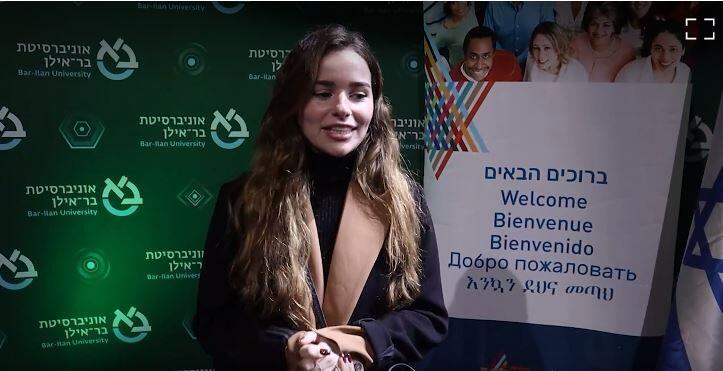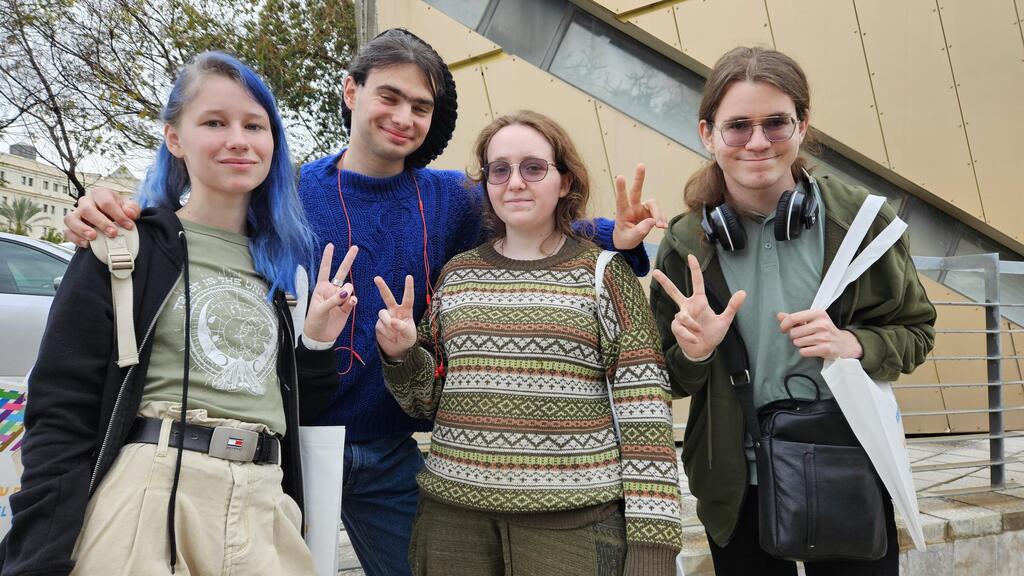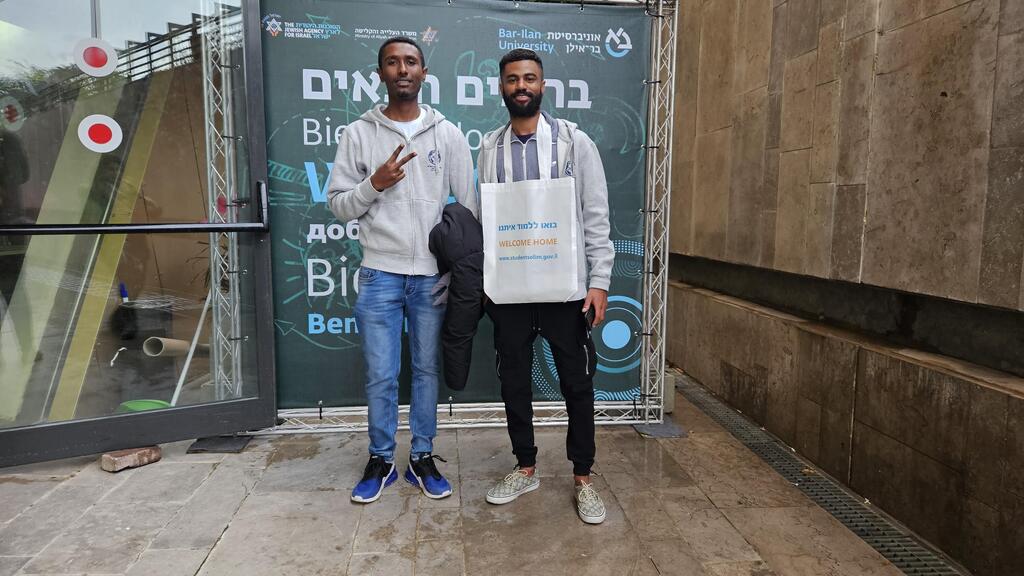Even nowadays, when Israel is embroiled in intense and divisive disputes, new immigrants, including young people, continue to arrive. They find themselves in a tumultuous nation quite different from the places they left behind. Do the judicial overhaul and widespread protests influence their decision to come to Israel?
- How I became a target of the Islamic Republic of Iran/ Emily Schrader
The Young New Immigrants Fair, held this week at Bar-Ilan University, provided a good opportunity to gauge the sentiments of the younger generation amidst the significant upheaval currently affecting Israel.
A large number of attendees interested in studying at the university were from Russia and Ukraine, but there were also immigrants from countries such as Turkey, Ethiopia, Peru, and even a young man from Tunisia who adamantly refused to be identified.
"You have to be abroad to understand"
Shelly Shuver, a 20-year-old who immigrated to Israel from Paris about eight years ago, has completed her military service in the IDF and started her first semester at Bar-Ilan, studying criminology because "my dream is to serve in the Israel Police." For the event, she brought her friend from her military service, Sheryl Benisho, 21 years old, who immigrated to Israel about three years ago and lives in Ra'anana.
She is interested in studying biotechnology and psychology. The two came to explore their educational options: "In two days, I will be released from the army, and I would love to start my studies in October. I will do everything to get accepted to Bar-Ilan University."
"Even in France, the situation has become less safe, and not just for Jews," Shuver says. "There have been many attacks, so as a Jew and generally as a human being, I personally prefer the country and the security here, despite the attacks and despite the protests and demonstrations in the streets."
"I always tell Israelis: You have to be abroad to understand," she adds. "I'm not involved in all the chaos and reforms. I try to stay informed, but when you're in the army, it's not part of life there. We don't talk about these things much, and I appreciate that because I think politics shouldn't get mixed up in the army. This can create divisions that will be very difficult to heal. This is the opposite of what they say about the army, which is a melting pot - a place that unites."
Shuver says she is feeling "pained me to see everything that's happening in the country. It hurts to witness this rift, with neither side willing to give in or genuinely try to understand the other. However, no country is perfect. I spoke at a conference with many young French people who don't really understand politics in Israel, but they are very afraid in France. They want to live in peace, have a fresh start, and find an opportunity for a good life, and Israel is an excellent place for that. They also asked me how I was doing in Israel and if I had plans to return to France, but I told them I'm here until the end. Nothing will make me leave because I have no other place to be."
"Better than life under Putin's regime"
Many of the young people gathered in the entrance square of the hall, enjoying the unexpected winter sun. Among them was 18-year-old Georgi Zaves from a small town in Belarus. "The security situation in Israel doesn't worry me at all, and the whole issue of reform doesn't interest me either," he says. "I don't even think many Israelis here understand the plan. Those of us coming from Russia, with all the tensions there, the war with Ukraine, the economic pressure, not to mention the violation of freedom of expression and violent repression—I fear nothing. Any other country, and certainly a free democratic country like the State of Israel, is better than life under Putin's regime," he says.
"I'll give you an example of what living under a dictatorship is like and what it means to live in the shadow of a real fear of a government that doesn't serve its people: about two weeks ago, a 6th-grade girl drew a picture displaying the flag of Ukraine and wrote that she was against the war. The class teacher reported this to the school principal, who then reported it to the police. The girl was taken from her single-parent father and placed in an orphanage with psychiatric treatment. Her father underwent a difficult and violent investigation and is expected to be sent to prison because of the drawing his daughter made. Do you think this was reported in the official media in Russia? Absolutely not. We received the information through social networks, and it was reported only in a minor way outside the country," he says.
"You in Israel simply don't know how to appreciate the freedom you have, the ability to express an opinion freely without someone handcuffing, arresting, or severely punishing you for it. In Russia, you can only dream of a free democracy like you have in Israel. That's why I'm here. I want to study here, build my life here, and be a proud Jew who lives freely in the Jewish state," Zaves says.
In October, 17-year-old Asia Kazlova arrived at the reception center in Karmiel on a direct flight from St. Petersburg: "I came to the conference to hear the offers. To be honest, I left confused," She says. "There's so much information and material to think about," she laughs, saying that she's debating between studying physics and art and hasn't yet decided on which university to attend.
"I see the news about the attacks and the escalation of the security situation in Israel, and yet, it's much, much more dangerous to live in Russia these days. And it's not just the war against Ukraine. I'm determined to live my life in Israel, and no tensions in Israel will influence me to decide otherwise," she says.
"I don't understand anything [about the judicial overhaul] but I'm not worried at all. I'll try in the coming months, and maybe I'll need the coming years as well, to learn about it in order to know and understand who's against whom and what's going on. In the meantime, I'm trying to learn the sides," she says.
Tefra Gethon and his 25-year-old friend Bayilan Worku immigrated from Gondar in Ethiopia about seven months ago. They live and study Hebrew at the absorption center in Jerusalem. Gethon is an accountant by profession and his friend is a hospital worker.
"I see and hear the protests mainly in the media, but I don't really understand what they're about. I'm not angry. I'm still learning," he says. "To me, as a foreigner looking from the outside, it seems like a kindergarten with spoiled children whose teacher is missing. The State of Israel is known for its democracy and the ability of every person to express their opinions freely, unlike in Ethiopia. There, it's like a democracy, but not really. Freedom of speech and action is a very important thing, and Israel is a good example for many countries in the world."
What they are interested in now is to continue studying Hebrew at the absorption center in Jerusalem, and when they finish, to find a good job in their field. Gethon has ambitions to continue his studies at Bar-Ilan University: "As an observant religious person, it is very important for me to be around people who uphold tradition and at a university with added value," he says.
"The political situation in Israel doesn't really bother me, because in the end, the whole system will work out as long as there is a strong government and as long as there is discourse and democracy. I believe in this government, I believe in its prime minister, and I believe that what the people chose is what should be. This is the essence of democracy. You just have to give things time," he says.
"On the other hand, I am very worried about the security situation. In Ethiopia, we saw on the news what was happening here, and we followed with concern, and here in Israel as well. It is quite scary, but not scary enough to drive us away from here. I am aware that even though this is the state of the Jews, it's not always safe for a Jew on the streets of Israel, and this is something that must change because security is essential for everyone. I have people I love who live here, and I care about them too, but still, I think this is not a reason not to immigrate to Israel. On the contrary, we need to increase our immigration and be strong against those who want to destroy us," he says.
"I trust Israel's strong army, which I would like to join as a volunteer in the future, and I also trust the strong police we have, despite the criticisms that have arisen in the recent protests. You just have to let them do their job. True, not everything is perfect, and there is room for improvement, as with everything, but I still trust that there are those who guard. It is also important to show confidence and solidarity in the face of terrorists and attackers, to demonstrate that we are strong and unafraid. Even though I am afraid, and that is natural."
His friend Warkow adds: "We need to support the State of Israel and the Jews who live in it and show a presence. Now is the time. Many people in the world admire the State of Israel and its democracy. This is precisely the reason that more and more young people, including immigrants from all over the world, choose to live there and start a family there, to raise children in peace. Israel is a good place to live."
Yonatan Tiani, 28, a general practitioner, immigrated from Colombia six months ago. He recently left the reception center in Ra'anana and moved to a shared apartment in Tel Aviv. He is currently looking for an internship in a hospital, at the same time as work. "It's hard. I admit it. Friends and family say I'm really brave. Some say crazy. But everyone respects my decision because they know how difficult it is to live in Israel, and they really encourage me to continue and hold on. The security and political situation in the country is quite difficult, but on the other hand, it's exactly the time to make aliyah. Yes, I'm not going to lie, I'm afraid of terrorist attacks. For example, the attack last week in Tel Aviv was very scary. It could easily have been near my house. The city center is a place I walk around a lot."
Regarding politics in Israel from an immigrant's perspective, he says: "I don't like the political situation in Israel. I attended most of the protests, held the Israeli flag, and shouted with everyone, 'Shame. Shame. Shame.' I want to live in a democratic country because I know what it's like to live in an undemocratic country ruled by the powerful. It is very difficult. I lived in Venezuela until I finished my studies. Fortunately, there is a strong Jewish community there, but it was difficult to be Jewish with all the anti-Semitism there. As a citizen of Venezuela, whether you are Jewish or not, it is difficult to live under the regime there, and I don't want the State of Israel to reach such a situation."
Zohar Yanon, CEO and Senior Vice President of Bar-Ilan University, who attended the conference, addressed the young attendees: "Bar-Ilan University is the fastest-growing institution in terms of student numbers, according to the CBS data, and we also welcome the highest number of immigrants. We take pride in our international students from various countries who come to Israel and consider our campus as their second home. We will continue our efforts to maintain this distinction and hope to see more and more new immigrants among our students."
Minister of Immigration and Absorption Ofir Sofer, Chairman of the World Zionist Organization Yaakov Hagoel, and Director of Absorption Programs at the Jewish Agency, Orly Zuckerman, also attended the event. Minister Sofer said at the fair: "I am delighted to meet hundreds of young individuals who have chosen to embrace Zionism and immigrate to the State of Israel. Integrating young people into academic studies and the job market is crucial for optimal absorption in Israel. Upon taking office, I emphasized the importance of investing in promoting immigration among young people, and that is what I am working towards




